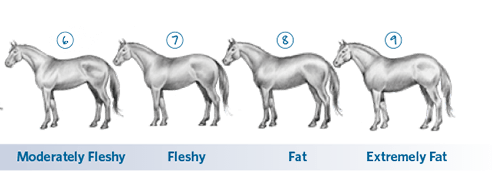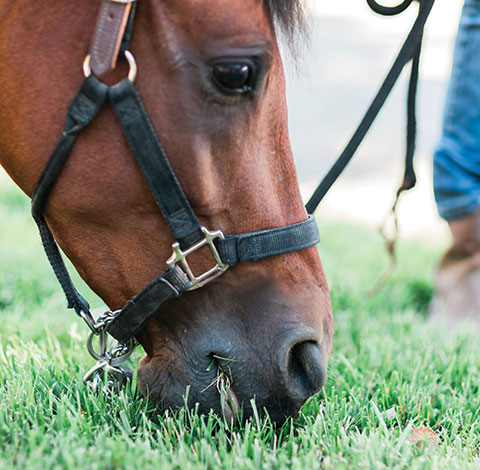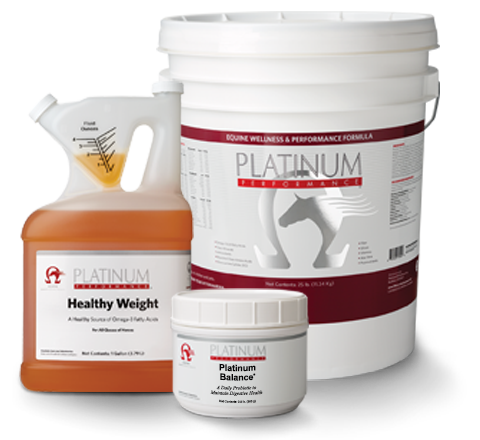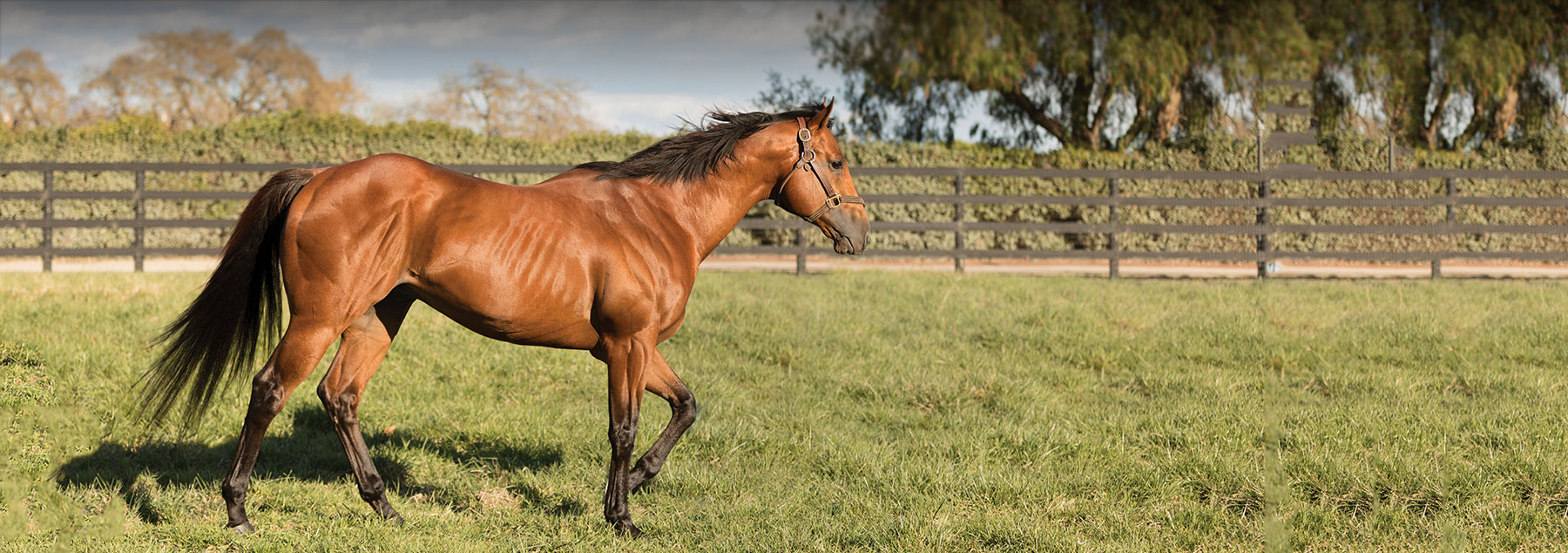Genetics Play a Large Role in a Horse's Metabolic Rate, But Optimizing Forage May Also Be Significant
There are few things that seem to take more time than putting weight on a skinny horse. How a horse can appear to have dropped 100 pounds on a trailer ride, then take months to put the weight back on can exasperate any horse owner. Compounding this enigma is how the other horse in the trailer seems to maintain his weight simply on fresh air. Horses are individuals, and what may work for one may not work for another when it comes to weight management.
Genetics may play the largest role in a horse’s ability to maintain weight. Horses vary widely in their metabolic rate, which is their ability to burn calories. The metabolic rate is influenced by genetics and body composition and determines whether a horse is a hard keeper, an easy keeper or somewhere in between. For example, the Thoroughbred is a classically leaner horse bred for athleticism and speed whereas some other breeds, particularly with pony influence, evolved on a thriftier genotype where it was advantageous to metabolically hold on to calories consumed and body fat for survival through periods of environmental harshness. Metabolic rate can also be affected by fitness level as an athletic or muscular horse will have a higher resting metabolic rate than one who is not being worked. The metabolism of the individual horse may play a significant role in how a horse processes the feeds he consumes.
For any horse that has true difficulty maintaining weight, the first call should be to the veterinarian for a thorough exam to check dentition, deworm and vaccinate as necessary, and evaluate general health, including body condition. This is particularly critical if the horse is suddenly losing weight. Use the veterinarian’s objective opinion as a valuable resource. He or she does not see the horse every day and can fairly evaluate body condition. A major underlying cause for weight loss is poor dental health, which is especially true for senior horses who may be experiencing difficulty chewing or are losing teeth and may require a softer diet. Older horses also tend to not digest and absorb their diet as efficiently as their younger counterparts. Other weight gain interferences include general digestive problems, such as ulcers or chronic loose stools, as well as low-level immune suppression, chronic disease and stress.
Utilizing high-fiber or high-fat feeding options, such as beet pulp, rice bran and rich sources of omega-3 fatty acids, can be very useful feeds for thin horses.
Allow the Diet to Work for You, Not Against You
Once general health concerns are ruled out, inadequate nutrition may be a reason that a horse cannot maintain body condition. It may be that the quality of feed needs to be improved, or that the overall diet is good but not given in enough quantity to meet the energy and protein demands of the horse’s age, life stage, activity level or metabolic rate. The horse’s maintenance requirements need to be met first, then he must consume enough additional calories to facilitate weight gain. Weight gain is a very slow process when done in a healthy way. Increasing a single body condition score requires about 40-45 pounds of body weight and a lot of patience. It should not be expected for a horse to gain a single body condition score in less than 60 days. Every horse’s metabolism is unique, and how a horse puts on weight is dependent on the individual horse.
A seemingly obvious dietary solution is to increase calories, and adding calories can certainly help a horse gain weight. However, there are some caloric options and feeding strategies that are healthier than others. Pouring on grains and other high starch and sugar options can have severe health repercussions, including colic, ulcers and excess behavioral energy. Instead, optimizing forage, both in amount and quality, should be the first step toward weight gain. Utilizing high-fiber or high-fat feeding options such as beet pulp, rice bran and rich sources of omega-3 fatty acids can be very useful feeds for thin horses. Oils will pack more caloric punch in the diet. Maintaining feed efficiency through the use of pre- and probiotics can ensure the horse’s hindgut is able to get the most out of the feeds given.
Body Condition Score for Optimal Equine Health & Performance
The Body Condition Score (BCS) can be a useful tool for developing diets appropriate for maintaining the health and longevity of an individual horse. Increasing a single body condition score requires about 40-45 pounds of body weight and a lot of patience.
Underweight
Horses are generally considered to be underweight with a BCS < 3. Being underweight may affect overall health and athletic performance. Horses that are extremely underweight with a BCS of 1 or 2 may have suppressed immunity and are at higher risk for contracting disease.
Overweight
A horse with a BCS of 7 is considered overweight, and BCS > 8 is obese. Being overweight may contribute to metabolic issues such as insulin resistance and laminitis. Obesity may be associated with reproductive dysfunction in mares.



Hay and Pasture
Maximizing forage is the critical first nutritional step toward weight gain. Grazing on pasture grass, when possible, provides a highly nutritious source of fiber, vitamins and minerals. It is considered “nature’s perfect food” for horses as the consistent small amounts of fiber from grazing flows through the gastrointestinal tract as it was perfectly designed to do. High-quality hay should be fed free choice for weight gain; both for stalled horses and those on pasture as well. The quality of hay is paramount. If the first cutting appears very stalky, it will most likely have too much indigestible fiber, and need to be switched to a leafier, higher quality and more digestible second or third cutting. Alfalfa can be very useful for weight gain. If a horse is maintained on grass hay, try adding alfalfa up to a 50/50 blend of grass to alfalfa. Alfalfa cubes or pellets may be soaked and used as well. Weighing your hay is important for weight gain. A general rule of thumb is to feed 2 percent of the horse’s body weight in hay per day to maintain weight. That is 20 pounds for 1,000 pounds of body weight, and many larger breeds weigh more than this. Closer to 2-3 percent in quality hay will most likely need to be fed to encourage weight gain. Flakes of hay can vary widely in weights, and it is good to know how much the horse is actually receiving each day, even if given free choice, in order to make adjustments.
Healthy Feeds
To gain weight in a healthy way, high-fiber and/or high-fat options should be implemented before the use of grains. Cereal grains, like oats, corn and barley, have a higher calorie content, but they also have very high levels of both starch and omega-6 fatty acids. Omega-6 fatty acids are naturally pro-inflammatory. Feeding a horse inflammatory feeds actually works against weight gain as the digestive system harbors this inflammation and does not digest and absorb efficiently. Conversely, ground flaxseed, which is found in Platinum Performance® Equine*, is a high-fat option and an excellent source of omega-3 fatty acids that support a healthy level of inflammation and support feed efficiency. Additionally, a comprehensive supplement like Platinum Performance® Equine* provides vitamins, macro and trace minerals and antioxidants to complement the diet and ensure that all necessary nutrient requirements are being met.
Beet pulp is another great choice for providing horses extra healthy calories needed to gain weight. It is considered a “super fiber,” meaning it has a higher calorie content than hay (and some grains) but also has a fiber content similar to a forage, so it passes appropriately through the digestive tract. Unmolassed beet pulp is very low in sugar content and can be a good addition to the diet for weight gain. Higher fat feed options can also be used to encourage weight gain. Rice bran is often used as a higher fat option to help with this. Many commercial feeds use a base of shredded beet pulp with rice bran for a high-fat and high-fiber option to help horses gain weight. Not just for older horses, some senior feeds can be useful for weight gain. Although it varies across brands, senior feeds are typically formulated with high-quality ingredients and are easily digestible. Usually, they blend high-fat and high-fiber calorie choices and are processed as a pellet or extruded to increase nutrient digestibility. Many senior feeds are considered “complete” feeds; they contain the necessary amounts of fiber, calories, protein and micronutrients to be fed without the addition of forage. Also, due to the fact senior horses are more commonly challenged with hyperglycemia and hyperinsulinemia from complications with Cushing’s disease, many senior feeds contain a limited amount of starch and sugar. A reputable senior feed may help promote weight gain in mature horses regardless of age.
Oils
Oils promote weight gain as they contain essentially pure fat. Fat offers a much higher amount of calories per gram; approximately 2.25 times the amount of calories compared to the equivalent unit of protein or carbohydrate. The natural diet of the horse is only about 3-6 percent total fat. However, horses are very capable of digesting and metabolizing fats and oils efficiently. It is typically recommended to feed no more than 1-2 cups per day of any oil; usually horses find levels over that amount unpalatable. The omega-3 to omega-6 ratio comes into play for oils as well. While corn oil, soybean oil and rice bran oil contain much higher levels of omega-6 fatty acids, oils from flax, such as Platinum’s Healthy Weight, provide a quality source of calories high in omega-3 fatty acids. To achieve weight gain from added oil, add a small amount to the diet, about 2 ounces per day, and increase gradually over 7 to 10 days to allow the microflora in the hindgut adequate time to adjust to a new feed. It may take several weeks for the body to fully adapt to a higher fat diet.
Pre- and Probiotics
The health of the horse’s hindgut can have a significant impact on feed efficiency and weight gain. The microbiome within the hindgut is made up of billions of beneficial bacteria, fungi, protozoa and enzymes that primarily ferments and digests the fiber found in forages and other feedstuffs. These fiber- digesting microbes must be healthy in order for a horse to digest and metabolize the feed he consumes, thereby allowing him to maintain his weight. The hindgut microorganisms are also necessary for the internal creation of the B-vitamins, which are needed for many processes in the body including metabolizing carbohydrates, fats and proteins into usable energy. There are several factors that can lead to a disruption within this tenuous biosystem, including illness, stress, over-consumption of starch or sugar, ulcers, forage deprivation and antibiotics. Disruptions can cause issues with digestion and a horse may not be able to derive enough calories to maintain weight. Prebiotics can support the health of the naturally existing microbes in the hindgut. Prebiotics, such as mannan oligosaccharides (MOS) and the fermentation products of the fungus Aspergillus oryzae feed the innate, good bacteria so that they are able to grow and multiply, resulting in healthy forage digestion. Probiotics are live microbes that add to the general microbial population. Two types of yeast strains, Saccharomyces cerevisiae and Saccharomyces boulardii, are examples of probiotics used to support nutrient digestibility and utilization in horses. Using a complete pre- and probiotic formula like Platinum Balance™ nurtures a healthy, thriving microbiome that can promote feed efficiency and digestive integrity and is a valuable dietary supplement for weight gain.
Healthy Weight Gain
It is extremely important to make any changes to the horse’s diet slowly, over at least 7 to 10 days, to allow the digestive tract to acclimate to new feeds. This is true for hay changes as well. All horses should have access to clean water and a plain, white salt block or loose salt. Free choice, quality hay is always the best place to start for healthy weight gain. Add a feeding when possible at night or for lunch. If possible, separate a thin horse, so that he can eat by himself without competing for food. Weighing all feed is the best way to know how much is being currently fed and will make it easier to adjust as needed.
Weight gain is a slow process, and it is easy to get impatient. Weighing the horse on a scale or with a weight tape is a good way to gauge progress. Assess the horse’s weight once a month to monitor weight gain. Take pictures of the horse from all sides and then again in a month and two months to help re-evaluate body condition. It can be difficult to effectively determine changes in weight when seeing the horse every day. If there is no change after one month, the diet may need to be adjusted again. After a veterinarian has checked the horse and diet changes have been made, one of the best things to do for weight gain is to have patience. Enjoy nourishing the horse, and know that weight gain in a healthy way is worth the wait.

Let Platinum Help Your Horse Gain Weight
- Platinum Performance® Equine* is a comprehensive daily wellness formula which provides omega-3 fatty acids, antioxidants, vitamins, trace minerals and amino acids to support digestive efficiency and an optimal weight.
- Healthy Weight is a cold-pressed, flaxseed oil high in omega-3 fatty acids and infused with natural vitamin E. Oils can facilitate weight gain as they provide over twice the amount of calories compared to proteins and carbohydrates.
- Platinum Balance™ is a pre- and probiotic blend with added glutamine to support gastric and hindgut health. The ingredients work synergistically to nourish an efficient and thriving hindgut microbiome, allowing the horse to get the most out of the daily feeds he consumes.

by Emily Smith, MS,
Platinum Performance®
